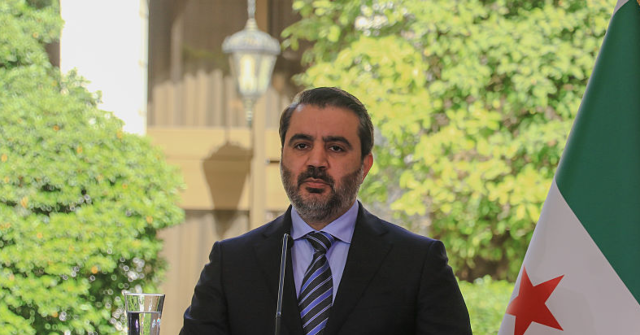The governments of Saudi Arabia and Qatar will subsidize the salaries of government workers under Syria’s nascent Islamist regime, the countries announced this weekend.
Saudi Foreign Minister Prince Faisal bin Farhan Al-Saud promised “joint financial support” for the Syrian government infrastructure during a visit to Damascus on Saturday that featured a meeting with President Ahmed al-Sharaa, formerly the leader of the Hayat Tahrir al-Sham (HTS) terrorist organization. Riyadh has been the single most vocal champion of the new HTS government, which took over the country after longtime dictator Bashar Assad fled in December.
Assad’s family ruled the country for over half a century, including through a decade and a half of civil war under Bashar Assad that began in 2011. Assad appeared to have defeated the many factions fighting to overthrow him for much of 2024 until HTS, a former al-Qaeda affiliate, launched an attack on regime stronghold Aleppo. The attack shattered the integrity of Assad’s forces and allowed HTS to march into Damascus.
Sharaa, formerly known by his jihadi nom de guerre “Abu Mohammed al-Jolani,” has since attempted to convince the world, and in particular the West, that HTS is not interested in establishing a Taliban-style fundamentalist Islamic state. Instead, he is advocating for the world’s wealthiest countries to invest in the rehabilitation of Syria’s devastated cities after years of war, promising significant financial benefits to those who invest early.
Saudi Arabia’s advocacy for Sharaa resulted in President Donald Trump meeting with the interim president — who he lauded as a “young, attractive guy” — and announcing that America would lift the onerous sanctions placed on Syria during the Assad regime. Those sanctions, American officials have since explained, were imposed as a result of actions, including human rights atrocities, committed by the Assad regime, so punishing the group that overthrew that regime does not advance the goal of the sanctions.
Saudi Foreign Minister Prince Faisal’s visit to Damascus was intended to announce new incentives to help the HTS government thrive and promote global business investment in Syria. To attract such commitments, Prince Faisal announced that Riyadh and Doha would help pay the salaries of Syria’s government workers.
“The kingdom will provide with Qatar joint financial support to state employees in Syria,” Reuters quoted Prince Faisal as saying, highlighting that the foreign minister did not offer details on exactly how much “financial support” Sharaa should expect.
The Emirati newspaper The National reported that Saudi Arabia and Qatar later published a statement clarifying that Syrian government workers could expect their support “in a three-month period.”
Elsewhere in his remarks in Syria, Prince Faisal announced that a group of unspecified Saudi businessmen would be touring Syria in the near future, seeking investment opportunities and sites to rebuild. The Saudi Foreign Ministry said the prince assured Syrian regime leaders that Saudi Arabia is “committed to providing all forms of support and assistance to the Syrian people.”
In his meeting with Sharaa, the state-run Saudi Press Agency (SPA) said he and Prince Faisal “focused on relations, with both sides discussing regional security and stability, as well as efforts to support Syria’s economy and strengthen its national institutions to realize the aspirations of the Syrian people.”
The HTS government was effusively grateful to the investments that Saudi Arabia is making in its success. Speaking about his meeting with his Saudi counterpart, Syrian Foreign Minister Asaad al-Shaibani said the areas of interest for Saudi Arabia include “economy, energy, and joint investment,” according to the state-run Syrian Arab News Agency (SANA).
“The support they have provided to Syria since the moment of liberation has been clear, constructive, and profound,” al-Shaibani detailed, adding that Saudi Arabia is also helping funnel investment into Syria by convincing countries such as America and France that post-Assad Syria is a potential financial partner. HTS government officials have emphasized that the lifting of U.S. sanctions is of particular significance in helping rebuild the state.
“We are particularly grateful for the role played by Saudi Arabia, especially in lifting sanctions, as these measures weakened the Syrian people,” SANA quoted al-Shaibani as saying. “They did not target regimes, but rather targeted our survival and recovery. We are fully aware that lifting sanctions is only the beginning.”
“The real work has begun now, and our government has already begun taking serious steps to prioritize the provision of basic services in all governorates,” he added. “The focus is clear and urgent on the areas of energy, electricity, water, fuel, food, and medicine that every Syrian citizen deserves.”
SANA also published more comments from Saudi Prince Faisal, who reportedly told his Syrian partners that Riyadh was interested in helping “strengthen the partnership with our brothers in Syria, which will contribute to consolidating stability and supporting opportunities for economic advancement, positioning Syria in its natural position and status.”
Prince Faisal added, “we affirm that the Kingdom will remain at the forefront of countries that stand by Syria in the process of reconstruction and economic recovery.”
Saudi Arabia has been a key player in bring Syria closer to the United States. President Trump met with Sharaa during a visit to Saudi Arabia in May at the behest of Crown Prince Mohammed bin Salman, who also attended the encounter.
“I felt very strongly that this would give them a chance,” Trump said of lifting sanctions after meeting with Sharaa. “It’s not going to be easy anyway, so gives them a good strong chance. And, it was my honor to do so.”
Sharaa announced the change in policy during a national address in which he described Trump’s decision as “courageous and historic.”
Follow Frances Martel on Facebook and Twitter.
Read the full article here


